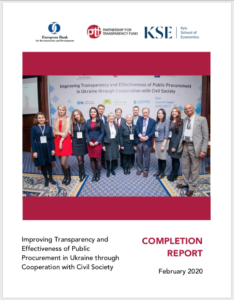REPORT
Improving Transparency and Effectiveness of Public Procurement in Ukraine through Cooperation with Civil Society
FEBRUARY 2020
This report reviews the implementation experience and results of the project, Improving Transparency and Effectiveness of Public Procurement in Ukraine through Cooperation with Civil Society, co-funded by the European Bank for Reconstruction and Development (EBRD) and PTF. The Project was carried out by PTF from the Fall of 2016 through November 2019. It focused on building the capacity of Ukrainian Civil Society Organizations (CSOs) to serve as independent monitors of public procurement procedures and processes, with the goal of enhancing the transparency and fairness of public procurement using in Ukraine.
The adoption of a new Ukrainian law on procurement in 2015 and the introduction in January 2016 of the mandatory use of the newly created e-procurement platform, ProZorro, demonstrated the Government’s commitment to enhancing transparency and fairness in the procurement process. This commitment was further underscored by providing civil society groups, enforcement agencies and others with access to relevant procurement information such as tenders for goods and services, results of bidding auctions and winning tenders.
PTF hired the Kyiv School of Economics (KSE) as the local partner to help implement the project. With the help of KSE, a pool of 335 individuals representing 240 Ukrainian CSOs and journalists with the potential and motivation to engage in procurement monitoring was targeted for participation in the training program.
Following a high-profile project launch event in January 2017, a pilot training program with a small group of CSOs already engaged in procurement monitoring was held at KSE in Kyiv in February 2017. The goal was to assess the CSOs’ level of knowledge of the procurement cycle, including risks at each stage, as well as their familiarity with avenues for addressing problems, e.g., agencies and mechanisms to which to refer perceived irregularities.
This pilot revealed that there was a wide gap in knowledge and experience among these participants which resulted in a decision to design and offer two levels of training, basic and advanced. In November and December 2017, basic training was held by KSE in four major hubs in Ukraine – Dnipro, L’viv, Kharkiv, and Odessa – targeting CSOs in all 24 regions. A total of 113 individuals participated in the basic training. The advanced training took place at KSE in Kyiv in June 2018, with 32 participants representing 25 CSOs and some journalists, drawn from 16 regions of Ukraine. Post-training evaluations showed a high-degree of satisfaction among the participants with the content, the instructors and the modalities for procurement monitoring and flagging of irregularities to relevant Ukrainian agencies for redress. Training was held in Ukrainian, and the trainers were a mix of KSE staff, external topic experts hired by KSE, representatives of TI-Ukraine, and the Ministry of Economic Development. A PTF member, fluent in Ukrainian and Russian, attended the regional trainings as an observer.
The original project design included a pilot, but with no provision for grants to CSOs to test their ability to carry out actual monitoring after being trained. PTF thus added from its own resources a small grant component to fund three CSOs (selected on the basis of their responses to a Request for Expression of Interest) each for a period of six months (ending up becoming nine months) to engage in monitoring. The education sector was of interest for each of the three CSOs, so the funding from PTF stipulated a focus on that sector. In addition to funding, PTF also provided mentoring, primarily through its local representative based in Kyiv.
The results of the pilot monitoring were mixed. The CSOs reported identifying many irregularities, but their success in having official agencies respond to their requests for review and redress typically went unanswered. However, a six-month period is short, and it is conceivable that a longer period of funded monitoring might have yielded better results.
Overall, the training has measurably enhanced the knowledge of CSOs in how procurement works, how to identify suspicious data, evaluate the potential for abuse and gather supporting information to refer concerns to agencies charged with investigation and resolution. The existence of ProZorro and its related tools is a significant contribution to enhancing the transparency of public procurement and improving the quality of public goods and services to the citizens of Ukraine.
It is best put training to use soon after the knowledge and skills are acquired. While some of the trained CSOs may have sufficient organizational depth to put into practice what they learned, many operate with volunteers and on a shoestring budget. Furthermore, the ability to successfully promote effective and long-term engagement in public procurement monitoring by well-trained CSOs requires a favorable and stable legal and political environment, including widespread acceptance among procuring entities, control bodies and contractors and a willingness to act on the findings of irregularities. It also requires the development of systematic strategies and implementation plans by CSOs involved, continuous capacity building, and last but not least, sufficient funding for them to carry out monitoring over many months or even years.
PTF therefore recommends that future projects include post initial-training funding for successful CSOs to engage in actual monitoring for a period of at least two years during which they would receive technical support and continuous training. Such funding would preferably come from a neutral source, e.g., multilateral or bilateral donors, but business associations or industry groups could also provide such funding, provided they do not pose a conflict of interest for the independent monitoring activities. Transparency International and PTF can play a future role as objective observers monitoring the flow of money to CSOs to detect abuses.


